Open Source Web App Builders: No-Code Tools
Getting a custom software solution tailored perfectly to your company's needs can be costly. But it’s not just about the price. The more specific and complex your industry is, the more detailed and collaborative your efforts to explain it to developers need to be.
If only a solution could help you work around these issues. The solution that exists is nocode tools. This article provides additional information about no-code software tools.
How No-Code Tools Work
With no-code tools, you can create custom software without coding knowledge. Thanks to a simple drag-and-drop interface, your applications will be up and running in minutes. Not to mention how much money you can save compared to buying a custom-made application.
Pros of No-Code Tools
- Integrations with popular software.
- Drag-and-drop interfaces.
- Connectable databases.
- API functionality.
- Easy UI builders.
- Flexibility.
- Reduced costs.
- Customizability and extensibility.
- Ability to self-host.
Cons Of No-Code Tools
- Limited compared to building custom software from scratch.
- Limited security features.
- Customizability is sometimes limited to predefined templates.
- Limited ownership of the software you build.
Low-Code vs No-Code Tools
When reading about no-code tools, you will often see low-code tools mentioned interchangeably. But are there any differences between the two?
Low-code is a development approach that allows automated code generation via visual building blocks such as drag-and-drop interfaces. Because of this automation, low-code users can build apps faster by reducing their need for manual coding. Low-code is a happy medium between no-code and manual coding.
No-code is another development approach frequently seen as a subcategory of low-code development. While developers still have to perform some scripting in low-code platforms, no-code is entirely hands-off, relying only on visual tools.
Here is a look at some of the best no-code tools.
Top 10 Open Source No-Code Tools
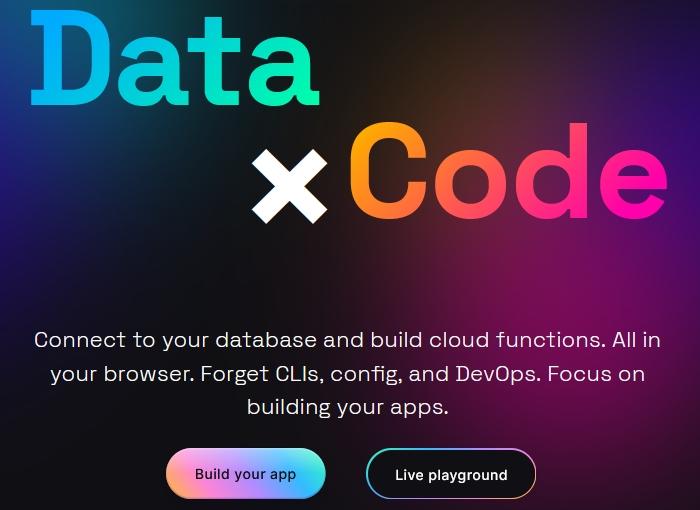
1. Rowy
This platform allows you to create apps by linking databases and building cloud functions. With it, businesses can quickly get a great UI comparable to Airtable, a cloud collaboration service headquartered in San Francisco. You can customize Rowy with Javascript (JS) and use its API functionality. It's also worth mentioning that Rowy utilizes Google's Firebase and Firestore.
You can use Rowy to build database workflows, mobile apps, expense management software, and more.
Rowy Features
- Built-in code editor.
- Role-based access rules.
- Real-time collaboration.
- Support for over 30 fields.
- Your product's data is kept within your firebase.
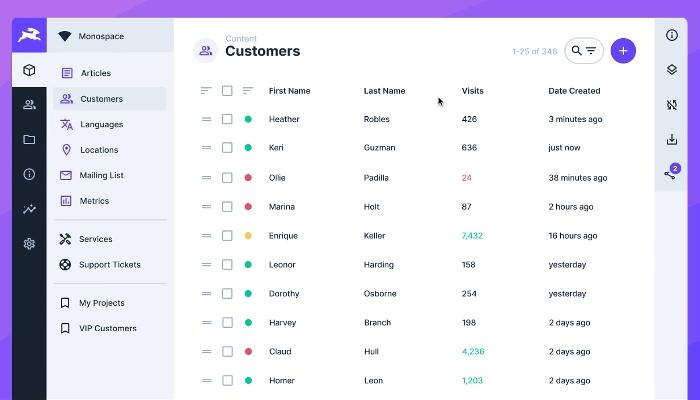
2. Directus
Directus is a headless CMS capable of rapidly converting any SQL database into an API and an app. Through Node.js and Vue.js, its modular codebase is entirely based on Javascript. As a result, it is extensible and performs very fast.
Directus allows you to create databases and webpages using technologies such as Next.js and React.
Directus Features
- Adaptable and modular.
- Ability to replicate your database.
- Simple, user-friendly interface.
- Data access via SDKs, API, and more.
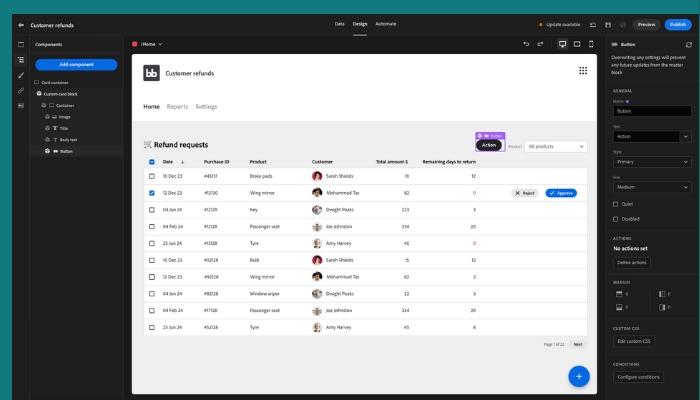
3. Budibase
Budibase supports hosting your apps by utilizing tools like Kubernetes, Docker, and similar software. In addition, you can use it to connect to external databases and collect data via REST API. Starting from scratch is easy because you can utilize the platform's built-in database. But remember that you can also import an existing one.
Using Budibase, you can build business apps, forms with seamless integration, admin panels, and more.
Budibase Features
- Built-in database for working from scratch.
- The ability to connect to external sources like Amazon S3, Airtable, etc.
- The ability to control who has access to your data.
- API integration support.
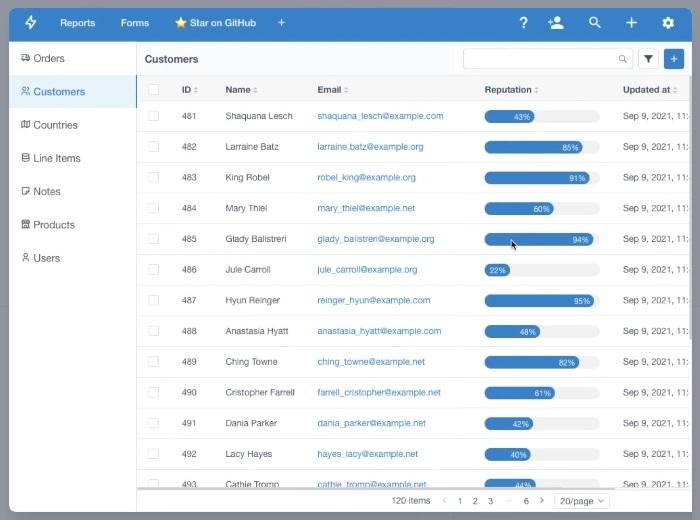
4. Motor Admin
Motor Admin allows its users to launch custom admin panels. It allows you to manage data effortlessly with a simple user interface. You can also conduct data analysis. It saves you time, protects your data, and comes with community support.
Using Motor Admin, you can create administration panels, complete sales apps, healthcare solutions, dashboards from SQL, and much more.
Motor Admin Features
- Data manipulation is made easier using a user-friendly interface.
- Custom SQL reports can be used to analyze your data.
- Custom forms for any task.
- Integration of APIs to automate Email using API integration.
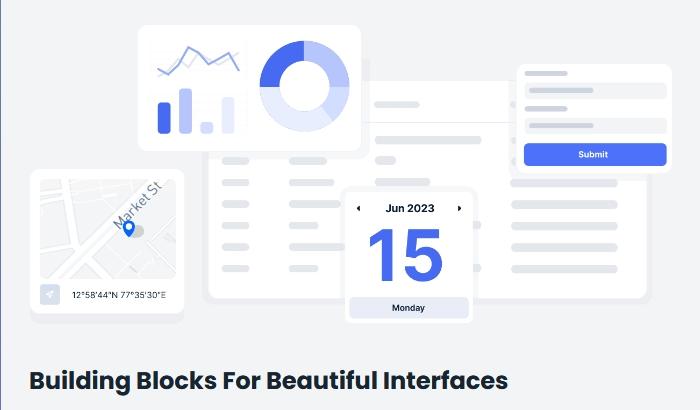
5. ToolJet
ToolJet no-code app tool provides custom open-source solutions for developing internal tools vital to company operations. It allows you to create complex front ends without even knowing about CSS or HTML.
With this platform, you can build tracking solutions, human resource management apps, coupon code apps, complete CRM solutions, and much more.
ToolJet Features
- Integrates with 100+ tools
- 35+ built-in UI components for creating frontends more easily
- Team collaboration features.
- State inspector similar to Redux.
- Support for custom components.
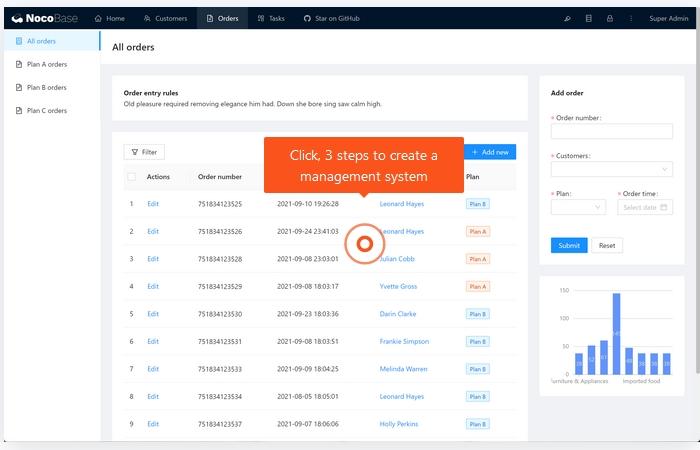
6. NocoBase
NocoBase no-code software tool allows you to quickly create scalable collaboration solutions that utilize data tables and fields. It's available on GitHub and supports Koa, Formily, and React.
With NocoBase, you can create management systems, collaboration solutions, and more.
NocoBase Features
- Automate routine actions.
- Simple and expandable architecture.
- Based on Node.js.
- Tools like Formily, React, and Koa are part of its supported stack.
- Configurable access controls based on user roles for menu, configuration, and data action rights.
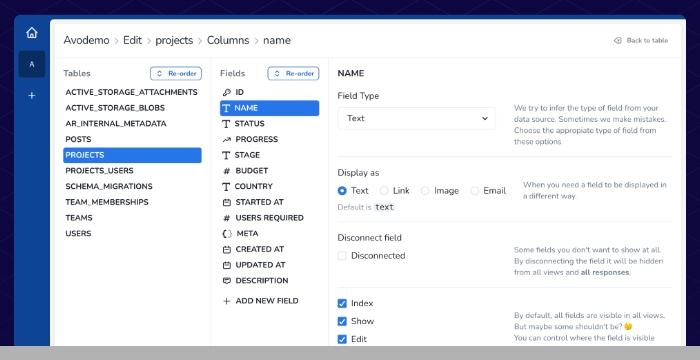
7. Basetool
Basetool is a no-code app tool that can assist businesses in better managing their data. It improves teamwork by making data administration simple. Thanks to Basetool, your team can focus on the core business aspects while knowing that the data is fully managed.
In addition, Basetool can be used to create software such as internal tools and product MVPs.
Basetool Features
- Customizable data access roles.
- Self-hosting support.
- Extensive data security.
- Mobile-optimized UI.
- Automatic mapping of database columns to the appropriate fields in Basetool.
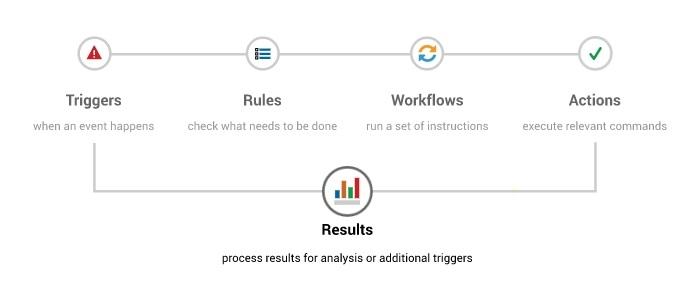
8. StackStorm
This no-code tool allows you to automate DevOps by streamlining complex workflows. It is best described as a large automation engine. It easily integrates existing infrastructure by connecting your existing applications and workflows.
With StackStorm, you can create DevOps automation, workflow automation, IFTTT management software, security software, and more.
StackStorm Features
- Units for content deployment called packs.
- Triggers for external events.
- A variety of outbound integration types called actions.
- Customizable rules that connect triggers and actions.
- Sensors that enable integration with existing infrastructure.
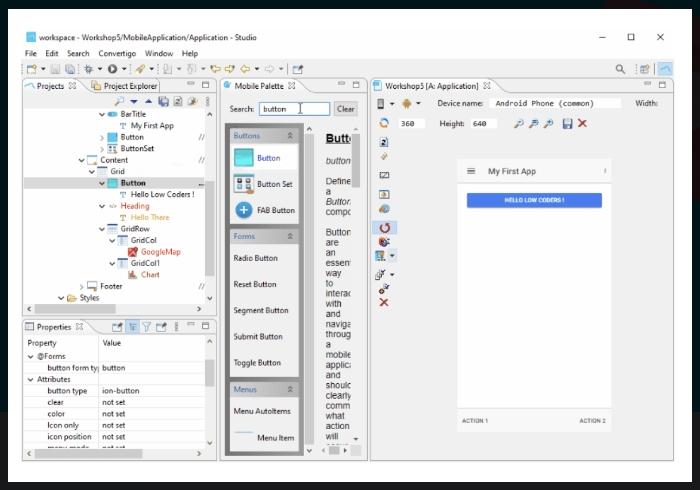
9. Convertigo
Convertigo is an open-source enterprise-grade no-code software tool. Scalable implementation and a long list of capabilities make it ideal for enterprises. This platform is divided into two parts, one focusing on no-code and the other on low-code.
Convertigo can be used to create travel apps, mobile banking apps, self-service portals, retail software, and much more.
Convertigo Features
- Business flows.
- API and data connectors.
- Task scheduling.
- Data safety.
- User authentication.
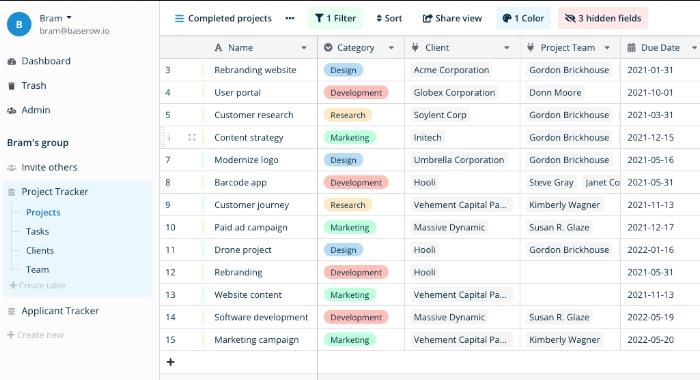
10. Baserow
Baserow can create online databases that can be self-hosted with Docker, Heroku, Ubuntu, and Cloudron. Alternatively, you can host them as SaaS. This no-code tool is an excellent alternative to Airtable.
Baserow can be used to make educational tools such as weekly planners, writing guides, and much more. Additionally, you can use it for employee performance evaluation, personnel directories, and other HR tools.
Baserow Features
- A single interface for everything.
- live collaboration support.
- Unlimited rows.
- Based on Django and Nuxt.
- Great flexibility to meet your demands.
- Integrates well with other software.
Bottom Line
No-code tools help you create software solutions with little coding knowledge. Additionally, they save money and time compared to ordering custom-made software. If you’re ready to try one out, we suggest looking at the list of features and picking the most relevant to your business. You’ll be surprised to see how quickly you can make apps with these great tools.
If you need to add hosting to the list while you try out this no-code tools list, Liquid Web is the answer. Our VPS Hosting, Cloud Dedicated Servers, and Dedicated Servers are great options. VMware Private Cloud also provides a great option for an all-in-one development, production, and testing environment. Contact our sales team today to get started.
Related Articles:

About the Author: Joseph Molloy
Liquid Web Security Operations tech Joseph spends his days cleaning up malware and doing his part to keep the Internet safe. He is interested in all things Linux and always looking for something new to learn. In addition, he enjoys cooking and playing guitar, is an avid horror and sci-fi reader, and is a fan of black metal music.
Our Sales and Support teams are available 24 hours by phone or e-mail to assist.
Latest Articles
How to use kill commands in Linux
Read ArticleChange cPanel password from WebHost Manager (WHM)
Read ArticleChange cPanel password from WebHost Manager (WHM)
Read ArticleChange cPanel password from WebHost Manager (WHM)
Read ArticleChange the root password in WebHost Manager (WHM)
Read Article


